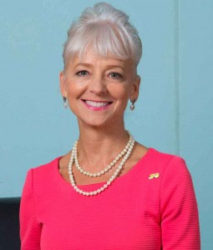A report in the Sunday December 4 issue of the Jamaica Gleaner has quoted Kelly Tomblin, the President and Chief Executive Officer of the Jamaica Public Service Company (JPS), the island’s electricity supplier, as saying that the country’s growth continues to be stymied by its inefficient use of energy, making it one of the worst in Latin America and the Caribbean.
Jamaica is set to sign a new power purchase with Eight Rivers, the latest renewable project set to build a solar plant, and Tomblin says that energy efficiency is now an integral part of the vision of JPS, which holds a monopoly on electricity generation in Jamaica.

company CEO Kelly Tomblin
“Jamaica’s energy intensity of approximately 4,800 kilowatt-hours (kWh) per US$1,000 of gross domestic product is one of the highest in Latin America,” according to Tomblin, who says that the island’s hotels can save 107 gigawatt hours (gwh) of the 446 gwh of energy the sector consumes annually by adopting energy-efficient solutions. That equates to some US$21 million annually based on Tomblin’s gauge that the sector spends about US$0.20 per kWh. She indicated that the amount which the sector can save equates to third-highest in the Caribbean next to Cuba and Dominican Republic.
Energy efficiency measures include optimizing air-conditioning units, installing efficient LED lights and upgrading electrical appliances. The potential saving attributable to hospitals range up to 39 per cent from investments of $21.4 million in energy-efficiency measures; banks and back office operations can save up to 20 per cent from spending of $27 million; office buildings can save 28 per cent from $19.5 million; cafes and restaurants can save up to 50 per cent from $2.1 million; gyms can save 32 per cent from spending $3.8 million; private schools can save 21 per cent from $1.6 million; and homes can save 30 per cent from spending $600,000.
Traditional street lights, which are managed by JPS, are to be replaced with energy ‘smart’ lights nationwide, aimed at saving 55 per cent on consumption.
Tomblin photographed thermostats in hotel rooms, which usually read 60 degree Fahrenheit, in order to make a point to management about the inefficiency.
“I asked the owners, ‘Why is the hotel so cold?’. They say the customer demands it,” she said. “There is this idea that we are trying to please the hotel customer base and that leads to a lot of waste.”
The energy consumed by JPS customers grew by an annual 5.0 per cent for the first time in years.
The Gleaner wrote that JPS continues to diversify from solely heavy oil fuel to include liquefied natural gas and some 115 megawatts of renewables. The company is also embarking on a smart grid and smart city project, which is links with energy conservation.




